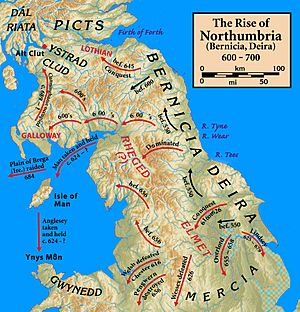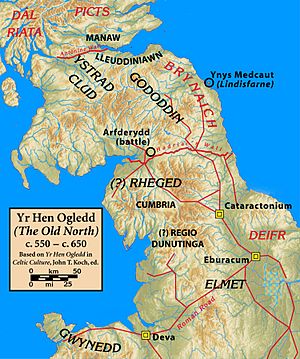Cadafael Cadomedd ap Cynfeddw facts for kids
Cadafael ap Cynfeddw (meaning Cadafael son of Cynfeddw) was a king of Gwynedd, a kingdom in Wales. He ruled from about 634 to 655 AD. He became king after the previous ruler, King Cadwallon ap Cadfan, was killed in battle.
Cadafael is mainly remembered for his unusual nickname: Cadafael Cadomedd. This means "Battle-Seizer the Battle-Decliner," which suggests he might have avoided battles. It was quite unusual for a king of Gwynedd at that time, because Cadafael was not from one of the main royal families. Old Welsh stories, called the Welsh Triads, even call him one of the "Three kings, who were of the sons of strangers" or "Three Peasant Kings."
Cadafael's time as king was a very important period for the Welsh people, who were called the Cymry. There was a strong alliance between the Welsh and King Penda of Mercia. This alliance had been started by Cadwallon ap Cadfan. They were constantly fighting against the powerful Kingdom of Northumbria.
Even though the alliance had some important victories, it ended very badly. King Penda died, and Northumbria became the strongest power in both the north and central England. Many Welsh kingdoms like Pengwern, Manaw Gododdin, Gododdin, and Rheged were completely destroyed. The kingdoms of Gwynedd, Powys, and Alt Clud became much weaker. Much of the blame for these losses fell on Cadafael's reputation.
Contents
Gwynedd's Struggles and Alliances
When Cadafael's predecessor, Cadwallon ap Cadfan, became king around 625 AD, the Kingdom of Gwynedd was not doing well. King Edwin of Northumbria was very successful. He had conquered Welsh lands and defeated the Welsh at the Battle of Chester in 616. Edwin also took over Anglesey, forcing Cadwallon to escape to Ireland.
When Cadwallon returned, he managed to make Gwynedd strong again. He did this by forming an alliance with the Welsh kings of Gwynedd, Powys, and Pengwern. They joined forces with the ambitious Penda, the king of Mercia. Like the Welsh, Penda felt threatened by Edwin's growing power.
Together, this alliance fought against Northumbria. In 633, they defeated and killed King Edwin at the Battle of Hatfield Chase near Doncaster. After this, Northumbria split into its two older kingdoms, Bernicia and Deira. Cadwallon also defeated and killed their new kings, Eanfrith of Bernicia and Osric of Deira. Northumbria's main lands were then badly damaged.
Cadwallon's success brought new hope for the Welsh, but it did not last long. Eanfrith's successor in Bernicia, Oswald, reunited Northumbria into one kingdom. In 634, Oswald defeated and killed Cadwallon at the Battle of Heavenfield near Hexham.
Cadafael's Time as King
After Cadwallon's death, Cadafael continued the alliance with Penda and the other Welsh kings. The wars against Northumbria went on in the north and central England. Between 635 and 641, Penda defeated the Kingdom of East Anglia and killed their king. He also killed the next king of East Anglia in 654, showing that Penda was becoming the most powerful ruler in the region.
The most important battle during this time was the Battle of Maserfield in 642 or 644, probably near Oswestry. There, Penda and his Welsh allies defeated and killed King Oswald.
However, the wars in the north did not go as well for the alliance. Northumbria took control of the eastern coastal area of Lothian (which was Gododdin) around 638. There were also battles against the people of Alt Clut (an early form of Strathclyde) in the 640s. Although the historical records don't give the exact results of these battles, most of what is now southern Scotland came under Northumbrian control. This suggests Northumbria was successful.
Still, Penda and his alliance were a big threat. They surrounded Oswald's successor, Oswiu, at his fortress of Bamburgh in 650 or 651, but they could not defeat him.
The most important moment came in 655. Penda again led an alliance of Mercians, Welsh, and others against Bernicia. They surrounded Oswiu at a stronghold in the north and forced him to ask for peace. After winning this war at a great cost, the alliance members started to return south. The Welsh were especially happy to have gotten back important items that Northumbria had taken from the kingdom of Gododdin.
However, even though Oswiu had been beaten, he was not defeated. Many leaders of the alliance had been killed in battle. Oswiu then launched a surprise attack at the Battle of the Winwaed (its location is not certain). King Penda was killed, which ended the alliance and made Bernicia the most powerful kingdom.
Oswiu quickly followed up his victory by taking over Mercia. He also launched a surprise attack on Pengwern's royal court, killing King Cynddylan and almost wiping out the entire royal family. After this, Pengwern disappears from history. Some of its survivors moved west, and others became part of a Mercian sub-kingdom.
The End of an Era
Oswiu went on to reunite Bernicia and Deira into Northumbria. He also gained temporary control over Mercia, making Northumbria the leading military and political power north of the Humber Estuary. Mercia would later regain its independence and become the main power in central England.
The future was very different for the Welsh people of the Old North and North Wales. While Alt Clud would become independent again, the kingdoms of Manaw Gododdin, Gododdin, and Rheged were permanently destroyed and vanished from historical records. Gwynedd became weaker and could not defend its own lands from attacks. It would not become a strong regional power again for 200 years. Powys was also weakened and would not be a military power again until it joined with Gwynedd under Rhodri the Great much later.
The death of Penda in 655 is often seen as the end of the "heroic age" for Welsh poets and storytellers (called bards).
Why Cadafael Was Blamed
We don't know exactly when Cadafael's reign ended, but it's usually thought to be soon after Penda's defeat. There are no records from that time about what happened. However, about 180 years later, a writer named Nennius said that Cadafael had gone home the night before the battle, when his ally needed him most. This implied it was a deliberate choice, which is why he was called the "Battle-Decliner."
It seems unlikely that Cadafael would have been chosen as king, or ruled for so long, or that Penda would have had an alliance with him for 20 years, if this was truly his character.
In the medieval Welsh Triads, the death of King Iago ap Beli is described as being killed by one of his own men, named Cadafael Wyllt (meaning Cadafael the Wild). However, another old record, the Annals of Tigernach, mentions Iago's death using a word that means "sleep," which usually suggests a peaceful death, not a violent one.
In an old Welsh prophecy called the Dialogue between Myrddin and his sister Gwenddydd, a list of future kings is given. It correctly lists kings up to Cadwallon ap Cadfan, but then it skips Cadafael. Instead, it lists Cadwallon's son, Cadwaladr ap Cadwallon, as following his father on the throne.
Whether it was fair or not, people genuinely disliked Cadafael and his name. An American writer in 1874, discussing Welsh names, noted that "Cadafael is still a name of opprobrium" (meaning a name associated with shame), even though the writer didn't know why.
 | Janet Taylor Pickett |
 | Synthia Saint James |
 | Howardena Pindell |
 | Faith Ringgold |



